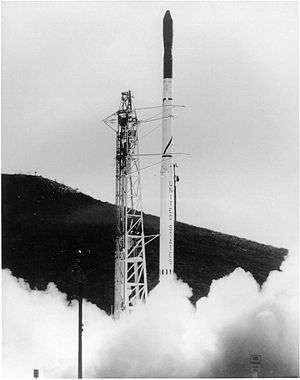Scout X-2B
| Function |
Sounding rocket Expendable launch system |
|---|---|
| Manufacturer | Vought |
| Country of origin |
|
| Size | |
| Height | 22 metres (72 ft) |
| Diameter | 1.02 metres (3 ft 4 in) |
| Mass | 17,000 kilograms (37,000 lb) |
| Stages | Four |
| Associated rockets | |
| Family | Scout |
| Launch history | |
| Status | Retired |
| Launch sites | Point Arguello LC-D |
| Total launches | 1 |
| Failures | 1 |
| Launch date | 1963-09-27 |
| First stage - Algol 1D | |
| Engines | 1 solid |
| Thrust | 440 kilonewtons (99,000 lbf) |
| Burn time | 44 seconds |
| Fuel | Solid |
| Second stage - Castor 1A | |
| Engines | 1 solid |
| Thrust | 286 kilonewtons (64,000 lbf) |
| Specific impulse | 247 sec |
| Burn time | 27 seconds |
| Fuel | Solid |
| Third stage - Antares 2A | |
| Engines | 1 X-254 |
| Thrust | 93 kilonewtons (21,000 lbf) |
| Specific impulse | 293 sec |
| Burn time | 36 seconds |
| Fuel | Solid |
| Fourth stage - Altair 2A | |
| Engines | 1 X-258 |
| Thrust | 22 kilonewtons (4,900 lbf) |
| Specific impulse | 266 sec |
| Burn time | 28 seconds |
| Fuel | Solid |
The Scout X-2B was an American expendable launch system which was flown during 1963. It was a four-stage rocket, based on the earlier Scout X-2, but with an Altair 2A fourth stage in place of the Altair 1A used on the X-2. It was a member of the Scout family of rockets.
The Scout X-2 was an all-solid rocket, with an Algol 1D first stagea Castor 1A second stage, an Antares 2A third stage, and an Altair 2A fourth stage. It made only one flight, which was launched from Launch Complex D at Point Arguello, carrying a P-35 weather satellites, P35-5. The launch occurred on 27 September 1963, and failed to achieve orbit.
References
- Wade, Mark. "Scout". Encyclopedia Astronautica. Retrieved 2009-07-03.
- Krebs, Gunter. "Scout". Gunter's Space Page. Retrieved 2009-07-03.
- McDowell, Jonathan. "Scout". Orbital & Suborbital Launch Database. Jonathan's Space Page. Retrieved 2009-07-03.
- Heyman, Jos; Parsch, Andreas (2007-07-09). "LTV SLV-1 Scout". Appendix 3: Space Vehicles. Directory of U.S. Military Rockets and Missiles. Retrieved 2009-07-03.
This article is issued from Wikipedia - version of the 8/27/2014. The text is available under the Creative Commons Attribution/Share Alike but additional terms may apply for the media files.
